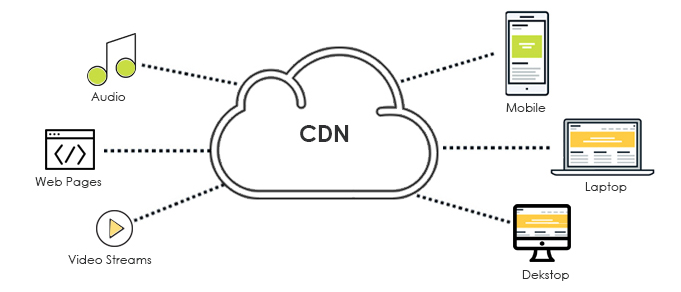What is CDN?
CDN is a content delivery network that is a distribute cloud network host at multiple data centres. It is responsible for delivering high speed and performance Website content to the end user. The aim of a CDN is to minimize latency, the delay that occurs from the moment. That you request a web page to the moment the page actually appears on your screen. Just by clicking on the link to when the page loads. This delay is cause by a number of factors. And one is the physical distance required from the server between the end-user and the web page.
How was the CDN work?
At its core, a CDN is a network of servers link to the goal of delivering content as quickly, cost-effectively, reliably and securely as possible.It will place servers at the interchange points between different networks in order to improve speed and connectivity. Internet exchange points (IXPs) are the primary locations. Where different Internet providers connect to each other in order to give each other access to traffic that originates on their different networks. Through connecting to these high speed and highly integrated sites, a CDN provider will reduce costs and transit times while delivering high speed data.
There are a few factors that make up a CDN such as PoPs, Caching servers, Solid-State Drives (SSD), Hard-Disk Drives (HDD) and Random-Access Memory (RAM). For CDN Points of Presence (PoPs) are strategically located data centres. They aim to reduce latency and bring content closer to the website’s visitors. Typically, a CDN PoP contains multiple caching servers. Then, for Caching Servers store and deliver cached files. They accelerate access to data and reduce bandwidth consumption by placing previously requested information in temporary storage, or cache. While for SSD/HDD and RAM inside the CDN caching servers, cache files are store on solid-state and hard-disk drives (SSD and HDD) or in random-access memory (RAM).
What are the Benefits of using a CDN?
The benefits of using a CDN are depending on the size and needs of an Internet property. There are 4 different components of benefit for it which are improving website load times with users experience faster page loading times by spreading content closer to website visitors using a local CDN server among other optimisations. Because users are more likely to click away from a slow-loading site, a CDN will minimize the bounce rates and increase the amount of time people spend on the web. In other words, a website better means more people can stay longer and stay around.
Next, reducing bandwidth costs with website hosting cost of bandwidth consumption is a primary expense for websites. CDNs can reduce the amount of data that an origin server must provide through caching and other optimizations, thus reducing the hosting costs for website owners.
Then, increasing content availability and redundancy through large amounts of failures in traffic or hardware will interrupt normal website operation. Due to its distributed nature, a CDN can handle more traffic. And be better able to withstand hardware failures than many origin servers.
Lastly, improving website security by improving security by providing DDoS mitigation, security certificate upgrades, and other optimizations.



